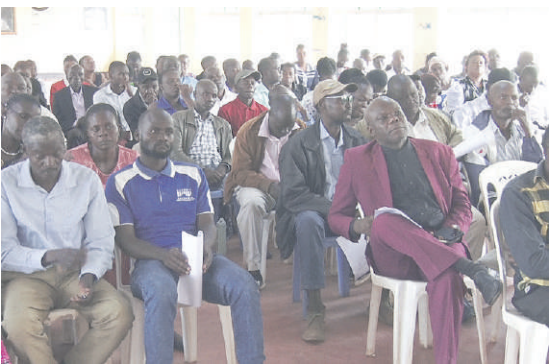
 Residents during a public participation forum on the proposed establishment of a research and Farmers Training Centre by the Kenya Marine and Fisheries Research Institute at Kakamega. /KNA
Residents during a public participation forum on the proposed establishment of a research and Farmers Training Centre by the Kenya Marine and Fisheries Research Institute at Kakamega. /KNAPublic officers who fail to consult Kenyans on proposed laws and projects face a fine of half a million in a proposed law read for the first time in Parliament yesterday.
The Public Participation Bill, 2025, sets out minimum standards
for public notices, accessible formats and feedback mechanisms.
It imposes financial penalties of up to Sh500,000 on public
officers who willfully sidestep the law.
The Bill also proposes the establishment of an Office of the
Registrar of Public Participation to coordinate and harmonise efforts across
all government levels.
It further designates the responsible authorities to develop
guidelines for public participation in each public institution.
In the proposed dispensation, clerks of each House would be
responsible for Parliament, the Chief Registrar of the Judiciary for the courts
and the Attorney General for the Office of the Attorney General.
The DPP, PSs of state departments, CEOs of commissions and
independent bodies, state corporation CEOs, clerks of county assemblies and
governors would be responsible for their respective entities.
“A responsible authority shall, before undertaking a public
participation exercise, notify the public of the exercises…and allow a
reasonable time for the public to make submissions,” the proposed law reads.
In the Bill, Parliament, to remove duplication of roles, will
conduct one round of public participation for bills and legislative proposals
before it.
If approved, bills and legislative pieces that require
consideration by the two Houses will only be subjected to a single public
participation process.
Once a committee has sought public views, the other House’s
committee would merely adopt its report and use the same as public participation
on the Bill.
Currently, the National Assembly and Senate committees conduct
separate public participation on bills and other legislative proposals.
While at it, the same witnesses appear and they barely change
their presentations to MPs, a situation the Bill by Rarieda MP Otiende Amollo
and his Ainabkoi MP Samuel Chepkonga seeks to change.
The Bill is being fronted to help conserve public resources and
end a persistent source of frustration for citizens and lawmakers alike.
“Where a committee of one House of Parliament has conducted
public participation on a bill, a committee of the other House may rely on the
report tabled by the committee of the originating House,” the Bill says.
It provides that the other house may only seek additional views
on the Bill with respect to substantive amendments made in the consideration
process.
A committee of the originating House may hold a joint public
participation with the corresponding committee of the other House for
government-sponsored bills.
“A committee of a House of Parliament may take measures to avoid
duplicating public participation conducted by a committee of the originating
House.”
There are concerns that public participation has remained
“patchy, poorly coordinated, and in some cases, entirely absent”.
The courts have, in this regard, thrown out many laws and
project proposals, for want of sufficient public participation.
A number of Kenya Kwanza policies were previously stopped on the
grounds that citizens were not consulted.
A court stopped an earlier bid by President William Ruto to
increase charges for renewing lost IDs. The renewal is now free of charge.
Judges also cited a lack of participation when Ruto appointed 23
Chief Administrative Secretaries. The recruitment was shelved entirely.
Presently, there is no law setting the threshold for what would
constitute effective public participation.
The Supreme Court advised in the BBI era that “public
participation must not be an illusion, but a meaningful engagement with the
people.”
It directed Parliament to “enact comprehensive legislation that
will implement the constitutional obligations [of public participation].”
The apex court guided that “public participation applies to all
aspects of governance”, and said lack of law on was no excuse for failing to
conduct the hearings.
“Public participation must be real and not illusory. It is not a
cosmetic or a public relations act. It is not a mere formality to be undertaken
as a matter of course to ‘fulfil’ a constitutional requirement,” the court
ruled.
The proposed law thus seeks to establish a national standard for
public participation, addressing gaps that have previously resulted in
"multiple court cases”.
According to official sources, over 2,000 court cases touching
on flawed public participation have clogged the Judiciary, with millions of
shillings lost to duplicated, rushed, or non-existent public consultation.
INSTANT ANALYSIS
As the Bill moves through its own public participation phase,
its success will be measured by its ability to transform a constitutional ideal
into a practical, efficient, and trustworthy reality for all Kenyans. By
tackling the issue of duplication head-on, the Bill promises a future where
public input is valued as a crucial component of lawmaking, rather than treated
as a repetitive procedural hurdle.


















